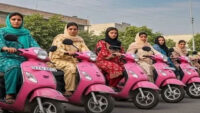Arif Shah was delighted when he heard his name was on the list of people granted permission to travel from India to Saudi Arabia to perform Hajj this year, along with those of his wife and son. After putting money aside for years, he had saved $10,000 to fund their pilgrimage.
When the Indian authorities declared a nationwide lockdown on Mar. 24 in an attempt slow the rapid spread of coronavirus cases, however, his family decided to cancel the trip and instead use the money to help others.
“We were really looking forward to visiting Makkah and Madinah for Hajj but the coronavirus intervened,” said Shah, 48. “We thought Allah does not want us to visit this year, He wants us to use the money for some noble cause.” The family’s generous gesture was motivated by the realization that many people had lost their jobs and homes as a result of the pandemic. It has created a humanitarian crisis in India, with thousands of desperate migrant workers who suddenly found themselves without any income forced to set off on foot to return to their villages in eastern India, in some cases a journey of 1,000 miles or more.
Shah and his family live in the city of Surat, in the western state of Gujarat, and for many people there the situation is just as desperate. So he enlisted the help of his 25-year-old son, Akram, who in addition to working as a textile merchant has been running a local Unity Charitable Trust (UCT) since 2016, and the family began to help the poor and needy. “His wife, Razia, 40, agreed, adding: “You go for Hajj only when Allah calls you. I feel Allah wanted us to serve His people this time, and we used the saved money to help those who needed it. This is also pious work.”






